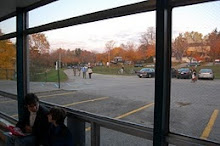The economy has been a big issue for politicians running for president in the 2008 primaries. The discussion has focused on education, preserving jobs, helping people buy healthcare, and helping homedebtors who bought homes they can't afford. The probably resonate with the middle class, but unfortunately it is impossible for the government to have much impact on these issues for the majority of people.
Someone has to pay for any policy that provides people with more education, healthcare, energy, housing, etc. That someone is mostly the middle class. The poor aren't able to pay. The rich are able to pay, but there are too few rich people to pay for the whole rest of society. If the middle class wants help buying healthcare or any other product or service, it has to be the middle class helping itself, either by sending its money to government and getting it back in services or by simply paying for the products and services themselves. Since the government has a record of inefficiency, I would prefer people to pay for the things they want and need directly with the least government involvement possible.
There are some legitimate arguments government involvement in middle classes purchases. One example is healthcare. The people may decide they want the government to spread the risk of a major health problem by asking everyone to pay something to subsidize the healthcare for those who require expensive treatments. Right now this can be done mostly by allowing people to pool risk using private insurance. People pay premiums each month, probably more than they'll ever receive in claims, because they don't know whether they are the one of the people who will have a major medical expense. As technology comes available to predict illnesses in the future, this system may stop working and government may need to spread the risk. Some people argue that private insurance isn't working even right now. That's fine, but politicians should make clear that they're asking the middle class to send their money to the government to fund this, and they should have to make a case for why the government can do a better job than letting people fend for themselves in the open market.
What about the poor?
The rich and middle class do have the resources to help the poor. Unfortunately, to sell such programs politicians have to make them apply to everyone. There is a real public benefit from not having an underclass with limited access to education and healthcare. In my values system, helping the needy is just the right thing to do, regardless of whether it produces a public benefit.
I would love to hear one of the candidates (besides Ron Paul) say, I'm asking you pay some taxes to help the needy because it's the right thing to do. If you're not needy, but you feel squeezed by the costs of paying for your kids' education and your parents' care, I'll do everything I can to get the government out of your life and out of your pocketbook so you can solve those problems.
That sounds sort of mean when I write it. There are countless lies that sound a lot nicer, but they just don't work.
The best politicians can do is try to encourage growth and discourage things that require extra consumption. Right now it's hard for the average person to afford cars and fuel for all adults, large houses, lots of consumer products on top of the basics. The good news is as GDP grows, soon it will be easy for the average person to afford those things and more. The answer is not to turn over the task of paying for the basics to the government. The answer is to turn over as much as possible to individuals and their ingenuity and let them prosper.
Tuesday, February 19, 2008
Subscribe to:
Posts (Atom)

